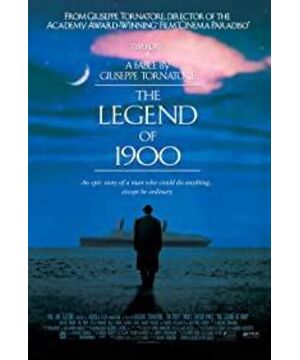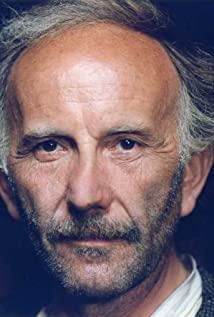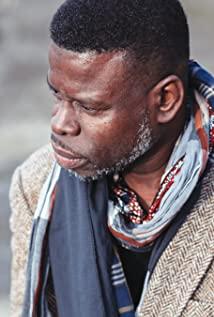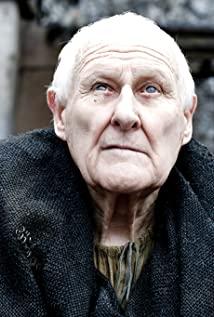The Pianist at Sea is really a great movie. The soundtrack is also very nice. I like this kind of inspirational creation. I would like to pay great tribute to the outstanding creator of this film! When I tried to put the image of the male protagonist, "1900," on paper, I found it futile. The brilliance of the story can only be experienced in the movie. The film's description of the protagonist is subtle and mysterious, so at that time I finally realized that a good film always makes it easy for you to understand what it wants to express, but it is difficult for you to express it.
An orphan who lives on a ship for life without legal status is an orphan. God and the sea endowed him with incredible musical talent. The general public and the upper class were fond of his music, and the founder of jazz was ashamed of his music. Yet his faith in life and music remains the same. In an era of materialistic desires and entrenched power, he could have obtained the opportunity to stand out with his own creations and entered the ranks of the successful, the rich, and the upper class. At least he can buy a big house, marry a good wife, have a few children, and live the American dream life. Facing the continental United States, facing love, facing his curiosity and yearning for the most beautiful voice, he finally chose to give up. A person insists—would rather give up his outer freedom and inner desires—but also insists on his original understanding and pursuit of life.
This is easier said than done! See a movie review mentioning "existentialism". When you get slapped in the face, you can still choose how to react instead of instinctively fighting back. This is a more common metaphor for existentialism. Whatever the outside world thought of his music, no matter how much prestige and wealth it could bring him, no matter how much he haunted his long-lost lover, no matter how long he was on the SS Virginian for the rest of his life.Whether he wants to destroy it in the end, he chooses to stop and stick to his life beliefs. This is a vivid portrayal of existentialism. But I would rather say that what makes the film more moving is that it is similar to Forrest Gump, who insisted on simple life wisdom in "Forrest Gump."
In a sense, it doesn't matter what you believe; what matters is whether you stick to what you believe. At the end of the film, 1900 explains his choice by saying that he could control and create an infinite life with the 88-key piano on the ship. In the face of an endless city with thousands of "keyboards," how do you choose "a woman, a house, a piece of land that belongs to you, or a view to enjoy, or a method to die?" It is to make him feel overwhelmed. So he would rather die on the boat than take a step on land. What's more, to the outside world, he is a person who does not exist. An absurd choice, a genius sacrifice, a huge difference and contrast with worldly life, will prompt us to think and understand.
Existentialism is closely related to the modern industrial revolution and the global urbanization process. The extreme social division of labor and the huge urban fortress make individuals seem extremely small and powerless in front of them. When you have become a dispensable screw in a society, how will you understand the meaning of life and make appropriate choices? Listening to self, heart, and nature is the natural conclusion of people's reflection and criticism of the greatest social change in human history. A lot of people see this and have a hard time understanding it.
In the past 1900s, people pursued and satisfied themselves, so why not in the current 1980s? Artists express their observations and thoughts in the most romantic way possible. The same movie, but given to different people with different understandings. Let's think about it carefully. In the decades since the founding of China, especially the 30 years of reform and opening up, the market economy has risen, the manufacturing industry in China has flourished, the global trend of thought has been violently impacted, and the process of urbanization has been vigorous. In the face of this social change, every one of us is not equally small and helpless.
When everything is changing in this world, what is there to believe that is eternal? I remember talking to a friend once that the fireworks in the temples in China have been prosperous recently, and he has a lot of experience. Originally a staunch atheist, he did not believe in evil, and he suffered four accidents in a row, losing money and seeing blood, which has left him a little out of control. I went to Putuo Mountain in person and asked for peace of mind. He asked me, "How do Communists persist in their atheism?"
I said, "Generally speaking, Marxism advocates that human beings control their own destiny." For disasters and misfortunes, Marxism seems to be only used to solve the problems of human beings as a whole, and it can't help the fate of individuals. In contrast, religion It’s different. At least in terms of spiritual comfort, religion can quickly bring you peace of mind. As the saying goes, there are believers, but there are no non-believers. "
A friend’s family traveled to Sichuan during the Wenchuan earthquake and then didn't come back either. I am also saddened by my friend's misfortune and hope that he will mourn and change. If Marx is alive, he can only be like me. Individuals are always small! It's just that for the entire human race or for the entire human history, those unfortunate events are always accidental (or have a certain probability). In this sense, there is a big gap between Marxism and religion. That is the "luck" that is related to the life and death of an individual. Every theory has its own applicable practical category. Beyond a certain category, the theory is no longer applicable.
In fact, Sartre, the founder of existentialism, finally turned to the research and reference of Freudian psychoanalysis and Marx's historical materialism in his later years, also because he discovered the limitations of existentialism theory. No matter how autonomous a person is, the choices he makes can never go beyond the limits of his physiology and experience. So I still want to say that the most moving and impactful thing about this film is not the philosophical reflection on the industrialized society that he wants to promote, but the fact that people must have some survival wisdom that they can understand when they live. Let's stick to it for life.
In this way, we can calmly face various encounters and "lucks" within the limits of our physiology and experience. In this way, we will gain unparalleled confidence and courage in pursuing the life and happiness that we think we deserve. The question is, do you have this confidence and courage now?
View more about The Legend of 1900 reviews











